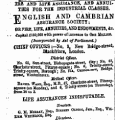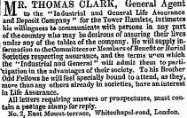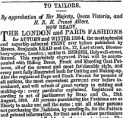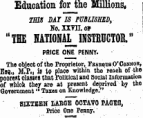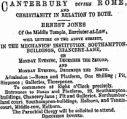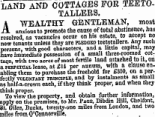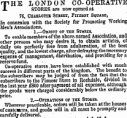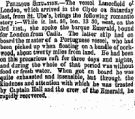On this page
- Departments (2)
- Adverts (11)
-
Text (7)
-

Untitled Article
-

THE NORTHERN STAR. SATURDAY, lYOVEMBJEIS 33, 1850.
-

Untitled Article
-

Untitled Article
-

Untitled Article
-

£0 tfrolTfflpOUDClUft.
-

Untitled Article
Note: This text has been automatically extracted via Optical Character Recognition (OCR) software. The text has not been manually corrected and should not be relied on to be an accurate representation of the item.
-
-
Transcript
-
Note: This text has been automatically extracted via Optical Character Recognition (OCR) software. The text has not been manually corrected and should not be relied on to be an accurate representation of the item.
Additionally, when viewing full transcripts, extracted text may not be in the same order as the original document.
Untitled Ad
IRE AKD LdJ < E ASSURANCE . AHD ANKUITIES FOR TH I mDUSTRIAL CLASSES . ENGLISH AND CAMBRIAN ASSURANCE SOCIETY : ORTIRE , L 1 FB , AlSUniES , ASD BNDOWMBSTS , &c ¦ Capital £ 150 , 000 with power of increase to One Million . ( Incorporated hy Act of Parliament ) CHIEF OFFICES :-3 fo , 9 , Sew Bridge-street , Blackfrlan , London . DistrUt Qfiees . No . 65 , Snn-slreet , Bishopsgata-street , ^ J . ^^ JJj Charlotte-street , Fitzroj-sqiue ; No . « , ^ S Trinitj-jquare , BoronjH ; So . 12 a . Ca nnon-row , Briage-Streit , Westminster . ittdical Qficcr . DAsn , *^^^ % »* gxgft £ 3 & tqnare ( on Monday ) , and 6 , luniij » " *< - v . from 10 to 3 . - LIFE ASSURANC ES INDISPUTABLE . Trustees . G M JtauuT , Esq :, Stephen Oedko , Jun ., E a * . Vtt-¦ BiiiaiBUK * ** jton to * .
Untitled Ad
mm ? 7 iMT > TTSTItIAL AND GENERAL T ^ UHS ASSUBANCE AND DEPOSIT COMPANY . Capital £ 100 , 000 , in 40 , 000 share * , of £ 210 « . each . 2 Watbbwo-piacb , Pail Maix , London ; ' " AHD 27 , Corporation-street , Manchester . Registered pursuant to Act 7 and 8 Yict . c . 110 .
Untitled Ad
MR . THOMAS CLARK , General Agent to the "Industrial and General Life Assurance and Deposit Company " for the Tower Hamlets , intimates his willingness t * communicate with persons in any part of the country who may be desirous of assuring their lives under any of the tables ofthe company . He will supply infarmat ion to theCommittees or Members of Benefit or Burial Societies respecting assurance , and the terms u on which the "Industrial and General" will admit them to partitipationin the advantages of their society . To his Brother Odd Fellows he will feel specially bound to attend , as they , more than any others already in societies , have an interest in Life Assurance . All letters requiring answers or prospectuses , must contain a postage stamp for reply . No . 2 , East Mount-terrace , Whitechapel-road , London .
Untitled Ad
fiALDWELL'S NEW , SPACIOUS , V AND ELEGANT ASSEMBLY ROOMS , Dj 3 au Street , Soho . Mk . Caldwell availi himself of this opportunity of returning his grateful acknowledgments to his Patr » ns , Pupils , and the Public lor the liberal support they have hitherto honoured him with , and begs most respectfully to announce that his Extensive Premises have been entirely rebuilt , under the superintendance of an eminent Architect , and are now replete with the most scrupulous regard to accomadation and comfort , which artistic skill , combined with experience , could suggest . The whole comprehending , it is presumed , the ehef-d ' ouvre Terpsichorean Establishment at the West-end , which
Untitled Ad
TO TAILORS . By approbation of Her Majesty , Queen Victoria , and H R . II . Prince Albert . NOW READY , THE LONDON and PARIS FASHIONS for AUTDMN and WINTER 1850-1 , the most splendid and superbly-coloured PRINT ever before published by Messrs . Benjamin READ and Co ., 12 , Hart-street , Bloomsbury-square , London ; and by G . BERGER , Holy well-street , Strand . This esquisitely engraved Print will be accompanied with Riding , Dress , Frock and Shooting Coat Pat . terns all of the newest and most fashionable style , and every part fully illustrated both for Cutting and Making-up . Also the registered Cape and Cloak Paletot for persons of all nations , the most convenient garment ever before introduced , and will admit of great variety in cutting and maldng-up : every particular explained . Registered according to act of parliament by Read and Co ., 28 th August , 1850 . AU persons purchasing the 1 asluons are at liberty to make and sell the same ; and all other persons not purchasing the Fashions , bysendingSs . for the Pattern and printed information , for that and all ather particulars for the The
Untitled Ad
Education for the Millions * THIS DAtIsTpUBLISHED , No . XITII . OJ " THE NATIONAL ^ INSTRUCTOR . " PRICE ONE PENNY . The object of the Proprietor , Feakous O'Connor , Bb « . i M . P m is to place within the ' reach of the poorest classes that Political and Social Information of whick they are afc present deprived by the GoTernment" Taxes on Knowledge . " SIXTEEN LARGE OCTAVO PAGES , Price One Penny .
Untitled Ad
CANTERBURY versus ROME , AND CHRISTIANITY IN RELATION TO BOTH . ERNEST JONES . Of the Middle Temple , Barri 9 ter . at . Law , TVItlt tECTtJRE ON THE ABOVE SUBJECT , IN THE MECHANICS' INSTITUTION , SOUTHAMPTONBUILDINGS , CHANCERY-LANE , ON Hondas Evening , December the Secohd , and Monday Evening , December the Ninth . Admission : —Boxes and Platform , One Shilling ; Pit , Sixpence ; Galleries , Threepence . ¦ ¦ To commence at Eight o'Clock precisely . Entrances to Boxes and Platform , 29 , Southampton , buildings , Chancery-lane ; Pit and Galleries , Northumberland court . Southampton-buildings , Holborn , and Tenniscourt , Middle-row , Holborn . . -... ' .. The Parochial Clergy will be solicited to attena . Discussion Invited .
Untitled Ad
LAND AND COTTAGES FOR TEETOTALLERS . A WEALTHY GENTLEMAN , most anxious to promote the causo of total abstinence , has resolved , as vacancies occur on his estate , to accept no new tenants unless they are pledged teetotallers . Any such persons , with good characters , and a Httle capital , may hare immediate possession of a small three-roomed cotta ™ , with two acres of mosl fertile land attached to it , on a perpetual lease , at £ 14 per annum , with a clause onabling them to purchase the freehold for £ 3 D 0 , on a perfestly voluntary pbinciple , and by instalments as small as half-a-crown each , if they think proper , and when they think proper . . To view the property , and obtain further information , apply on the premises , to Mr . Page , Dibdin Hill , Chnlfont , St . Giles , Bucks , twenty-one miles from London , and two miles from O'Connorville .
Untitled Ad
T HE LONDON CO-OPERATIVE STORES are now opened at 76 , CnAEiiomt Stbeet , Fitzbot Squabe , In connexion with the Society for Promoting Working Men ' s Associations . 1 . —Object of the Stores . To enable membei'g of the above-named Association , and other persons who may desire it , to obtain articles , of daily use perfectly free from adulteration , of the best quality , and the lowest chaise , after defraying the necessary expense of management , distribution , and providing for a reserve fund . , ' Co-operative stores hare been established with much success in different parts of the kingdom . The benefit to the subscribers may be judged of from the fact that the subscribers to the Pioneer Store in Rochdale , divided in the last year £ 801 ) afterpayment of all expenses , although the goods were charged considerably below the ordinary price . 2 . — Operations of the Stores . Wherever practicable , orders will . be taken at the houses of custcMsrs , and gooas will in all cases be promptly and carefullj delivered . .. _ of
Untitled Ad
Perilous SiHmtion . —The vessel Lancefield o * London , which arrived in the Clyde on Saturday last , from St . TJbe ' s , brings the following romantio story : — "While in lat . 40 , Ion . 13 30 , west , on the 3 rd inst ., she spoke the barque Emerald , bound for London from Cadiz . The Jatfcer Bhip had on board the master of a Portuguese vessel , who had been picked up when floating on a bundle of oorkwoodi about twenty miles from land . He had been on this preo » riou 8 raft for three days and nights , and during the whole of that period was without food or fresh water . When got on board he was quite exhausted and insensible , but through the kindness and attention with which he was treated by Captain Hall and the crew , of the JGmerald , he rapidly recovered ,.
Untitled Ad
NOTICE TO SUBSCRIBERS . Will be ready for delivery with the Northern Star on Saturday week next , an authentic , highly finished , and beautiful bteel Engraving , Two Feet Long , from the contractors ( Fox and Henderson ' s ) own Drawing ofthe _ _
Untitled Article
Thb West Riding Delegate Meeting . —We have received a letter from M / . Christopher Shackleton , in rep ly to , and contradictory of , the assertions put forth in a letter by Mr . Lawson , which was published in the 'Northern Star' of last week / Acting upon our general rule of refusing insertion to all personal vituperation we must decline the insertion of Mr . Shackleton ' s Utter . Any statement of facts , written in a proper spirit , shall have prompt attention . ¦ Nottinquah , — Mr . J . Sweet acknowledges the receipt of the following sums ( sent herewith ) : — Refugee Fund—A Ladies' Boot Binder Cd—fromCarrington 7 s Cd—from the
Eagle Tavern 2 s Gd . Todmobdes . —To the Editor of the Northern Star . —Sir , — You will much oblige me by correcting an error made by the omission of the sui ? n ame' Kydd . ' Samuel Kydd was the person nominated to serve in the present Executive , in the plaoa of Mr . Thomas Brown . I have committed the oversight myself j it is in last week ' s Star . —Yours , most respectfully , James Mooney , Sec . JOHN Hesisiin i Cheltenham . —Tour proposition would never be adopted , and could not gtre satisfaction if it was , to the numerous parties interested in the question . Under these circumstances the publication of your letter would
be useless . : ¦ 6 . B ., Sheffield . —Much better . Try again . To CoitnESPoNDENTS . —We are compelled , through press of matter , to postpone several communications .
The Northern Star. Saturday, Lyovembjeis 33, 1850.
THE NORTHERN STAR . SATURDAY , lYOVEMBJEIS 33 , 1850 .
Untitled Article
A BRITISH MINE OF REAL WEALTH . Mr . Ferrand ' s " Wool and Flax League " involves a sound idea . There can bo no measures of more primary and permanent importance , than the profitable development and application of the latent resources of your own soil , and the means of increasing remunerative employment for our industrial population . A brisk and healthy Home Market must always , from its very nature , be more advantageous to all classes than any amount of Foreign Trade ; and the true policy of a wise Government would be to make the one , in all cases , secondary and subsidiary to the other . The sudden rise , and equally sudden fal ) of all states that have depended mainly upon commerce for their wealth and greatness , is the best practical illustration of the folly . of the opposite course .
Indeed this country appeared as if it would speedily add another to the list of these illustrations . Within the last half century an enormous and unparalleled trade has grown up among us , resting entirely upon the supply of a material grown in far distant regions . To promote the success of that trade , and avocations connected with it , the whole commercial and fiscal policy of the country has been
gradually altered and adapted by successive statesmen ! Manufactures asumed the supremacy , and the tables of Exports and Imports became of much more importance in the eyes of our rulers , than the condition of the people . It is , to be sure , assumed , that when Exports and Imports are large , the other must necessarily be of a satisfactory nature ; but that is a mistake which needs uo
rectification to those who are practically conversant with the workings of our present system . How often large Exports are made at ruinous prices , which leave neither living wages to the workman , nor fair profit to the employer , in order to force sales , we need not say . How often a large portion of our boasted Imports merely go to add to the already numerous conveniencies and luxuries of the wealth y classes , is equally evident . The stream of riches flows far away from the dwellings of the poorbecause industrious classes . They may see , but they taste them not .
Feverish , fluctuating , and partial , however , as was the prosperity produced by our manufacturing and commercial system , the system itself bad grown to be , in the meantime , one of the natural necessities . Millions of capital were embarked in mills and machinery . Millions of individuals , directly and indirectly , depended upon the supply of cotton for a subsistence . Hence it was , with no small degree of alarm , that reflective men looked to the impending danger of the supply of that material being cut off , or bo materially diminished as to be inadequate to supply the wants of the population hitherto employed in working it up . This danger arose from two causes—one
accidental , the other essential . The last cotton crop was an exceedingly bad one , and , in consequence of the defective supply , prices had risen to such a height as to check purchases , except under strong compulsion . The present year ' s crop , it is now understood , will be at least equally scanty , so that a short supply and high prices must be the rule for some time to come , from this causo alone . If , however , the occasional failure of the cotton crop was all that had to be feared or endured , it is clear that the evil , however severe , could only bo temporary in its durations . With more favourable seasons , more plentiful supplies would have been poured in , and the wheels of our gigantic manufacturing machinery once more set in
motion . But a more serious danger menaced us in the growing demand for American cotton by American manufacturers . They do not see any reason why they should not work up into textile fabrics the raw produce of their own States , and sell them to other nations , as well as England , No more do we . It is very natural , and very proper . Nay , more , if they can manufacture it in the midst of the very plantation whero it is grown , so much the tetter , because the finished fabric will be
produced all . the cheaper , and cheapness being the sine qua wok of the agoi they will achieve the high destiny of driving everybody else out of the markets of the world . But what is to become of us if this takes place ? If , instead of sending us raw cotton to be spun and woven into shirts and dresses for people in every quar » ter of the globe , they keep the cotton to themselves , and supply our old customers , what are we to do ? A grave and serious question . Manchester set about answering it in its own way . First it tried to persuade Government to send out a commission to see what could be
done for procuring a supply of the raw material from British India . After careful inquiries as to the various places from whence a supply could be drawn , Manchester came to the conclusion that British India was the only place , But Government refused to be at the expense or trouble of doing this . ; Accordingl y , Manchester has "taken both upon herself , and , by a subscription of some three thousand pounds , has sent a Commissioner of its own to spend two years in India , with his note-book and pencils .
When he returns with the information he has collected , what then ? All the political and material obstacles he may discover will have to be overcome , and that will be a task of no slight difficulty and duration . Many , very many years , will certainl y elapBe
Untitled Article
before Indian can aupply the place of American Cotton ; and when it does , we shall find ourselvea driven to desperate and direct competition , with a powerful , energetic , and acute rival , who finds the cotton at his own door , while we shall have to draw our supplies from the remote provinces of a Continent many thousand miles distant . Truly , we see no very cheering prospect in all this . Even if Manchester succeeds in all it proposes to do , it will fall short of the requirements of the age—work , wages , and comfort for the toiling millions !
But while Manchester , as usual , has been looking abroad for the means of meeting immediate , and averting remote difficulties , we are happy to learn that wiser people liave had the common sense to look at home . They have been richly rewarded for doing so . If we are to credit the Morning Gkronicle , a series of discoveries have been made and perfected , which , in the moBt ample and satisfactory manner , meet the exigencies of our present position . Not only do they supply an immediate and adequate stock of raw material to the British manufacturer , but , provide at the same time , a profitable occupation to the
agricultural interest , which is suffering under such deep depression from the recent commercial policy of the Legislature , For the first time in actual life , it appears that manufactures and agriculture are to g ive and receive mutual support and strength . The old game of see-saw , one up and another dow * h , is to cease . The boast of the manufacturing towns , that they are in a high state of prosperity , is no longer to be answered by the wail of misery from the agricultural districts , and visa versa . At last the prosperity of both are to be truly identified , and labour , both in town and country , is to be set in motion , profitably for all parties .
If all these promises should be realised , it will mark one of the most important eras in our history . In order that our readers may judge of the probability of their being so ,, we will condense the detailed statement of our contemporary on the subject . It is stated , firstly , that a new mode of preparing flax for the manufacturers has been discovered , by which the dilatory , costly , and wasteful process of steeping is altogether avoided . The present method of preparing the plant for use , whether according to the ordinary mode , or under Shenck ' s patent system of steeping in hot water , involves a serious loss of time and labour , and is very detrimental to the quality of the fibre . The flax receives
various impurities , which have afterwards to bo removed by the no less tedious and pernicious operation of bleaching ; . and the consequence is , that , by the time it reaches the manufacturer ' s hands , it is both enhanced in cost , and deteriorated in strength and substantial value . This formidable hindrance to flax manufacture , it is stated , is now completely removed . By the simple and ingenious invention spoken of , steeping is entirely dispensed with , and no chemical agents being employed in the process , the fibre is handed over to the spinner in a perfectly natural and unimpaired condition , free from dirt and discolouration , and retaining all those oleaginous properties on which its strength so much depends .
That is step the first in these discoveries , and is invented by Mr . Donlan . The next , invented by Chevalier P . Claussen , is more extraordinary and more important . He has obviated one of the main obstacles to the extended use of linen fabrics—namely , their cold feel , and has succeeded in manufacturing the uusteeped flax into various descz-ipfcions of material , which possess respectively all the warmth of wool , the softness of cotton , and the glossiness of silk ! * * and which , " adds the Chronicle , " so closely resemble these several fabrics , both
to the eye and the touch , that we should neither credit the fact ourselves , nor task the faith of our readers by the assertion , had we not before us actual samples of the result produced , exhibiting , in one and the same bundle of fibres , the raw flax at one end , and the quasisilk or cotton at the other . '' The cost of converting unsteeped flax into " cotton " is only seven-sixteenths of a penny per pound , and the difference between the price of the flax when thus prepared , and that of raw cotton , is estimated as being from one-third to onehalf in favour of the former .
The crowning discovery has still to be mentioned . Many admirable inventions are either lost altogether for practical purposes , or are but slowly adopted in general use , because they require a totally different kind of machinery from that which exists for producing the articles . When we think of the immense capital sunk in the mills , factories , and workshops connected with our present cotton and silk manufactures , it isobviousj that if the new material had required new machinery , it would have interposed a formidable , if not insurmountable , obstacle to its general use . But it has been happily ascertained , that the existing machinery of oar cotton mills is adapted to the new material . The same invention
which dispenses with the steeping , render the flax suitable for a process which adapts it to the present machinery . The inventor took a quantity of his "flax cotton" to Manchester , placed it in the hands of a spinner , and the spindles , it is stated , took to it as kindly as if it and they had been made expressl y for each other . We observe , by the Chronicle of Wednesday , that Chevalier Claussen again proceeded to Manchester on Tuesday night , with introductions to the Chairman of the Chamber of Commerce , and Messrs . Ashwortii and Shuttleworth , extensive manufacturers , for the purpose of testing the matter still farther , by carrying out , upon a large scale , a series of experiments , with respect to the adaptation of flax to the cotton machinery .
Should these experiments terminate successfully , and the other inventions turn out to be in extended practice what they aro described to be in experiments , it is impossible to exaggerate their importance , and their beneficial bearing atthe present moment . The doubt and anxieties as to the source from whence our manufacturers may , in future , draw their supplies of raw material , will be at once dispelled : while , at the same time , a new and highlyprofitable occupation will be opened up to our agricultural population . The principle of Mr . Ferrasd ' s Loaguo will have triumphed , though without that gentleman ' s hatred to the "blood-stained cotton " system .
The extent and value of the market which will be opened to our agriculturists may bo judged of from the fact that , even with our limited linen manufactures , we import upwards of eight millions' worth yearly of foreign flax . The substitution of flax for cotton will , of course , enormously incrcaso tho demand , and the experience of Mr . Warnes , at Trimingham , in Norfolk , demonstrates the numerous pecuniary and social advantages to be derived from cultivating this crop . The results of that experience for many years may bo summed up aB rendering the farmer independent of foreign cattle , food , and manure ; ensuring the
maintenance upon the same space of double or treble the number of cattle usually kept ; the keeping of the land in a profitable state of cultivation , and preventing the possibility of its deterioration . In addition to this , its effects are to be traced in the increased employment and wages of persons of both sexes , and all ages the promotion of « ihdustry , frugality , and contentment ; a reduction of poor rates and diminution of crime , and an i ncreased consumption of articles of food and clothing In addition to the £ 8 , 000 , 000 worth of
roragn nax imported , thero ig also yeavlv brought from abroad five ; hundred thousand ? h « llZ f v v . ' f 01 > 8 OwiQg and <* ush ng ; W l + ° v . h , ? exceeds £ 1 . , 000 stfr-S r ? 1 ^ ich might also , with perfect ease , be raised at home . We observe that , enterprise is already a-ibot
Untitled Article
POLICE ESPIONAGE . We know not whether our Police authorities mean to introduce into this country the system of M . Carlier or not , but an occurrence this week appears as though they meditated some , thing of the aort . Now , having no desire to besubjected to a Republican regime like that existing in b ranee , we have to request of Sir George Grey and his Police subordinates , that they will leave us in possession of our com tnon and well established rights as Englishmen There is , as far as we know , no law whatever '
at the present tune , that empowers them to establish a . Police Espionage , or to interfere with the proceedings of open public . meetings , called for the discussion of public questions , and for the consideration of public grievances . Theseare rights sacredly guaranteed to us b y the constitution , and neither Home Secretaries nor Police Commissioners shall be allowed to trample upon them with impunity . The / attempt of the two disguised Policemen to sneak into the meeting in Turnmill-street on Tuesday night , was as ill-timed as it is un '
justifiable . Thero never was a period in the history of this country when the people were more quiet and orderly than the present . In fact , we may say , that political apathy is the prevailing character of popular opinion . The pretext , therefore , afforded by seasons of excitement and turbulent agitation for stepping over the strict limits of the law , do not now exist . If the authorities believed that there was anything dangerous or improper in the meetings at Turnmill-street , they ought to have sent their Officers openly in their regular uniform , not disguised as spies .
Having done that they cannot be surprised that irritation was the consequence . The melancholy results of the Police hatched plot , which sent Cuffe y and his colleagues from our shores as convicted felons , for life are too fresh , for men to feel cool when they see the commencement of what appears a simil ar conspiracy to entrap them -within the meshes of the law . The Whig Cabinet have acquired inefaceable infamy for the disgraceful manner in which they encouraged , and took
advantage of a fevr men who had been ensnared into connection with plans that were far more foolish and contemptible than they were dangerous or criminal . The partrons of Powell and Davis are not likel y soon to lose the character that attaches itself to such a connection , and it is to be feard that use has hardened them in the practice . Henceforth it would seem that we must regard Fo . lice Espionage as one of the means of govern , ment habitually employed by our liberal loving and constitutional Whigs .
We cannot understand the decision of the Magistrate . Supposing that the assault charged against Mr . Fuzzen had been full y and incontestibl y proved , the ordinary course , in such cases , is , to impose a fine , proportioned to tho violence of the assault , and the nature of the circumstances under which it took place . Mr . Coiibe , however , apparently thought there was something more to find out " , and therefore bound over the defendant in
sureties to appear on a future day , and answer any charges which may in tho mean , time be hunted up or concocted by his Police prosecutors . We should not be surprised , if by the time Mr . Combe has the matter again brought before him , n full-sized plot is hatched , with all the usual blunderbusses , drums , thunder , raw head and bloody bones , usual on such occasions . We all know , to our cost , that policemen are only human , and , of course , when their employers set them on the watch in plain clothes at Chartist meetings they understand what is wanted . What more natural than that they should find it ?
We call upon the middle classes and the community at large , to stand between a calumniated , maligned , and oppressed class , and this most improper and dangerous use of the Police force . They are bound to exert themselves to put a stop to it from a sense of self ' preservation . Who knows how soon the same weapon may be turned against other agitations unpleasing to those in power ? The sole
safe guard of the rights of all classes consists in their uniting to uphold , in all their purity and strength , those laws which guarantee the right of free thought , speech , and action to all Englishmen . That right has , in this case , been most grossly and carelessl y violated ; vud , we trust , that while it is met by immediate resistance and exposure , it will also be made the subject of Parliamentary inquiry at the opening of the Session ,
In conclusion—without knowing anything of the facts of the case further than appears in the police report—we would say to all parties who profess to be Chartists , that anything approaching either to violence or to secresy can only have the effect of damaging and retarding the causo they ostensibly wish to promote . The People's Charter embodies objecta , and rests upon principles so noble aud so just that they are certain to be carried if their advocates act in consonance with both . We feel confident we have the superiority
equally m principle aud argument . Why should any one throw away that advantage by having recourse to less worthy woapons ? Above all , we say , the man or men are enemies to democratic progress , who play into the hands of those in power by forming organisations , or agitating in a manner that tends to the inference ; there are concealed objects in view , or secret agencies at work . Let us have everything fair , and above board , and fight the battle for the Charter ia the honest , open , and manly manner which distinguishes our name and nation .
[ A press of other matter compels us to withhold several articles which had been piepared for insertion this week . ]
Untitled Article
MONIES RECEIVED For the Week Ending Thuhsday , November 21 st , 1850 . FOR THE WINDING-UP OF THE LAND COMPANY . Received by W . Rider . —John Little , Sunderlnnd ftl—C . Payne and J . Stephens , Red Marley Is—Wake&M Branch , per tl . Blackburn U los _ Stalybr ' idge Brnncli , pe / J . Woolley 12 s _ Messrs . J . H . aud W . Owen , Sheffield , perG . Cavil Is Gu-IIaworth , thirteen Membert , per \ V . Greenwood Gs Cd-J . Hemmin , Cheltenham ( M-E . Self , Great Cheverill Gd-Radclifle-bridge , per K . ffamej- ^ Cd . Received at Land Office .-A . Simpson Gd-R . Snuto <> & —J . Wilmot , Croydon Is—G . W . Gd .
THE HONESTY FUND . Received by \ v . RiDEB .-Jolm Little , Sunderlsmd 2 s 6 a —T . Fuwdon , Sunderland Is . FOR THE HUNGARIAN AND POLISH REFUGEES . Received by W . Rideb . —J . Booth , Lincoln ' - ' s Id-Rochester and Chatham , pel- H . Willis 10 s 10 d-FrestOB Chartists , per J . Brown 11—Ship Inn , Biraingluun . per J , Newhouse Gs 4 d—Nottingham , per J . Sweet 10 s tm—Haworth , per W . Greenwood 11 s 3 d—Bolton-lc-Moors . pe » Q . Ednnrd l / 2 s Gd-Hanley Cliartisti , per J . Bam ^ rd 1 rT J . Cooks , Shincliff Colliery 3 d ~ Messrs . Chandler , Howaw , Perry , Brown , and Hawken , Camelford , Cornwall . 8 Received by John Arnott .-G . P . ls-Suttou-m-Asli . field , per W . Felkin 10 s—Staljbridge , per W . Hill !«•
AGITATION FOR THE CHARTER . Received by John Abbott . —A Rochdale Chartist IS —• Arbroath , per J . Y . F * irweather 4 s . ld-G . P . ls- BlWto 1 ' per W . H . Cottle 5 s—Leicester , per W . Bvuzard K's-EXPENSE FUNDi Received at Land Office . —Hull i » . ;< " ¦ VICTIM FUND . Received at Land Office , —< 3 f . W ,
£0 Tfroltfflpoudcluft.
£ 0 tfrolTfflpOUDClUft .
Untitled Article
m this direction , A company has foenftaTT for the purpose of promoting the ero » n ? d flax on a large scale in Ireland , and the Bo ° / of Trade , in consideration of the imDorh ! of the object , have determined to relax e neral principle , and to grant a charter of inj " poration to the company . The example win be certain to be followed in other quart er greatly to the benefit of Ireland as well as tb / ' country ; and we are sure that every we ]] wieher to hia country wjII join with qg iq « ,- * expression of an earnest hope that the anfci . cipations excited by these statements may be realised .
Untitled Article
THE NORTTTBRN STAR . Noyimrat 33 , 1850 ,-
-
-
Citation
-
Northern Star (1837-1852), Nov. 23, 1850, page 4, in the Nineteenth-Century Serials Edition (2008; 2018) ncse.ac.uk/periodicals/ns/issues/vm2-ncseproduct1601/page/4/
-
